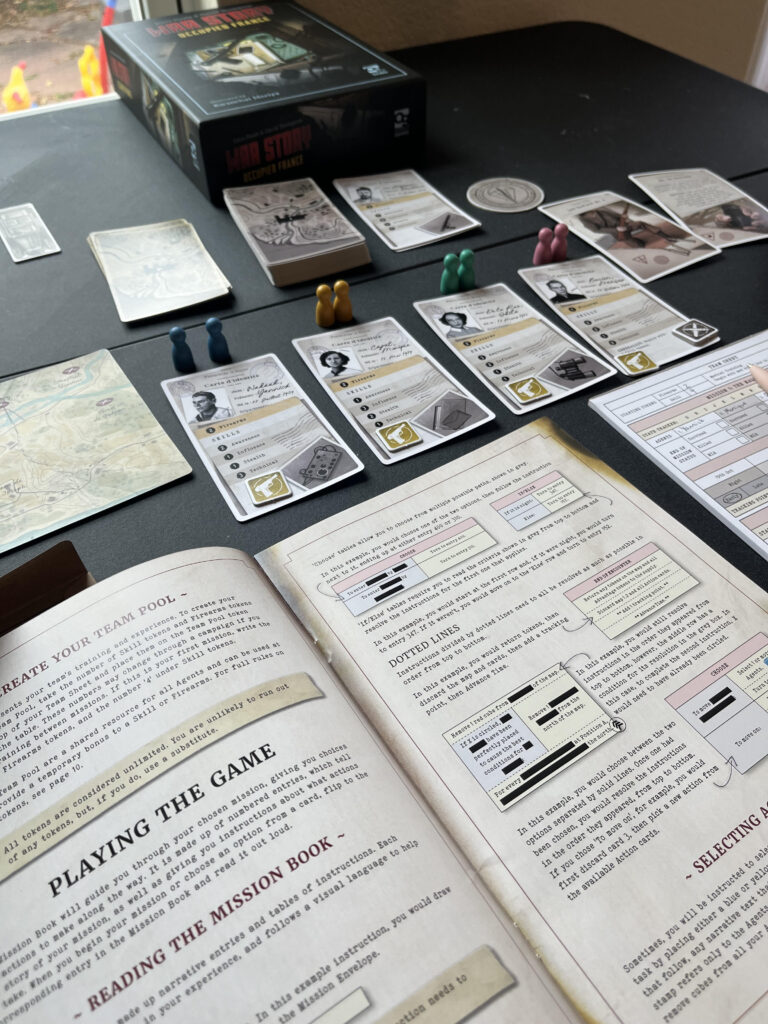**Very minor spoiler pic for the first encounter map of the game in this review. This image is also in the rulebook.**
David Thompson and I are extremely close. I can say this confidently because one time, he commented on a review I wrote. Instinctively, I knew that meant we were aligned on all essential matters of life. By which I mean guessing the fastest lane in traffic correctly, getting carts with 4 working wheels at the grocery store, and successfully peeling an orange in one go. Basically, the bedrock of a successful existence.
Okay, maybe I haven’t actually talked to him outside of that one comment. Perhaps it’s that I wish we were close and our children could grow up together because I just want to exist in his creative aura. If I can’t be that creative, I might as well be within range of it.

War Story: Occupied France is Osprey’s latest, and it’s very well done. It boasts the combined talents of Thompson and Dave Neale (of Sherlock Holmes Consulting Detective: The Baker Street Irregulars fame- and another soon-to-be best friend, depending on his orange peeling stance). This is the mash-up I never knew I needed. I love a good war game but when it comes to story games, I admit I have high standards. If you’re going to make a story game, it needs to be well-written and coherent. But more than that, I don’t want to just read a bloated fanfic. Make me care. It doesn’t need to become a classic work of literature, but I don’t want yet another story of played-out fantasy tropes or a narrative weighed down by forced sentiment.

Allow me a moment to give you a few more details on how the game plays, so you’re not totally lost. You take on the roles of 4 agents, working together to complete missions, evade capture, and weaken the occupying forces. You’re making strategic choices and flipping back and forth in the mission booklet to different passages based on those choices. This includes things like gathering intelligence, sabotaging enemy assets, and recruiting allies, which impacts both the story and gameplay. These choices are impacted by your agents’ skill attributes. You can supplement these attributes with skill tokens, but you have a very limited supply and must make difficult decisions on when to boost relevant attributes or not. It combines resource management and risk-taking with story arcs and character development, unfolding through mission events and challenges.
Within the various encounters you have with the Germans, you are provided with new mini maps and must strategically place your agents, trying to position them in a way that plays to their strengths. This feels very reminiscent of Undaunted. But you will forever be short on resources and skills, so you must try and decide the best moments to use your resources and hope you don’t lose anyone in the process.

I briefly discussed the challenge of telling stories in games in my Undaunted: Stalingrad review and I think it holds true for War Story as well. Grounding a decent story in an event that actually happened provides that hook I’m looking for. It adds stakes to the game in a way that regular fictionalized choose-your-own-adventure games seem to lack. I suspect this is because a historical basis allows your brain to fill in the more significant context. I fully believe fiction, including fantasy, can provide a moving narrative (obviously), but in the board game world it rarely does.
Characters and board games are almost antithetical. A character is made by how they act, but generally in a board game, action is divorced from characterization. You play the game, take your actions, and then flip back to the characterization. It’s usually mechanics and then flavor text. If there’s any room for a game to be moving in any way, it’s a great idea to create a setting that real people experienced, where our imagination can fill in the gaps with historical context, and put us in their shoes. This is precisely what War Story does.
Because it’s more “story first” as the name suggests, it finally hits the right balance for me. But the critical piece is that the gameplay doesn’t lack, despite it being more story heavy. It’s very fun! It’s integrated perfectly, so that action and character building no longer feels so divorced. It brings the individuals of the French Resistance to life with faces and personalities, making the emotional moments resonate more deeply. It’s not a gentle game that will bring you success no matter what road you go down. You will lose agents and others in your charge and the build up to encounters is tense. Your choices are made in the dark, relying only on the limited information at hand, mirroring the difficult, uncertain decisions faced in real warfare.
I’m not really sad that my agent, Christian, died, but it reminds me of those that had to make difficult decisions with poor information which caused others to die. Being put in that position, however lightly, seems meaningful and worthwhile. It’s forever valuable to walk a mile in someone else’s shoes because it increases our personal humility and lived understanding that not everything in the world is black and white.

The appropriate amount of tension is achieved for what this game is. It holds a realistic focus on the –and I don’t mean this as an insult– unprofessional espionage that occurred in WWII. These folks weren’t built from the ground up to be MI6 spies, but they entered that dangerous world out of necessity and a desire to have a say in the matter. Who doesn’t love a story of real courage when it matters most? And Thompson and Neale don’t feel the need to spell that out for us. They let their subjects do the talking, and are all the more successful because of it.
So with all that said, and ignoring all the lessons we learned from WW2, in my personal Dictatorial State, anyone who wants to write a story based game has to sit down and play this one first. Then we sit down in a room together under a bright white light and I ask you whether or not you can justify writing a book we all pay $55 for. Is there anything exceptional about this book-game that might be of interest to other people? Moreover, are you capable of writing about it in an engaging and challenging or inspirational way?
And if, after all that, the designer in question still insists they can churn out a compelling story…I’ll simply hand them an orange and politely insist they peel it in one go. Consider it the ultimate test of patience, precision, and respect for the story-driven legacy Thompson and Neale have given us.
Presentation
+Cards are large and easy to read
– Cards warped quickly
Getting It Played
+Easy to setup and teach
+Probably best solo
-Says 1-6 players but I don’t think I’d go over 2
Gameplay
+Meaningful decisions
+Story keeps you engaged
+Each mission is relatively quick, taking me about 1.5 hours my first time through a mission
+ Decent replayability with so many different decision paths
– Once you’ve explored each mission a few times, you’ve seen the whole game. Either wait a while to forget it all or sell at that point.
Fun Factor
+ Big decisions, small game
+ Get a good history lesson while playing a game
I personally gravitate towards movies and books with this type of theme so I am already sold!
You and me both!
[…] voice of All For One Games, if you want to read Allie’s reviews of Undaunted: Stalingrad and War Story: Occupied France, she is also a big […]
Thanks for the kind words!